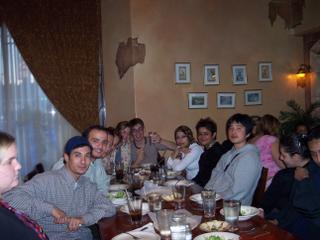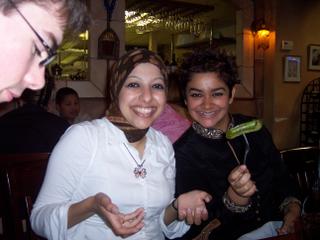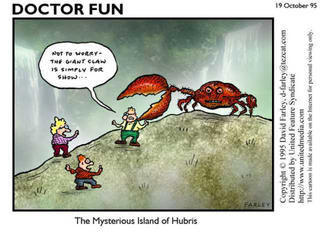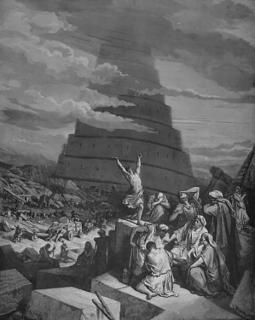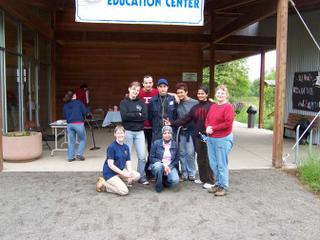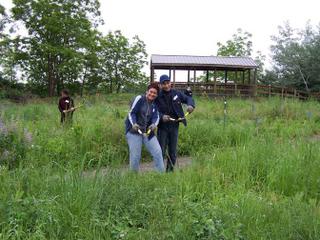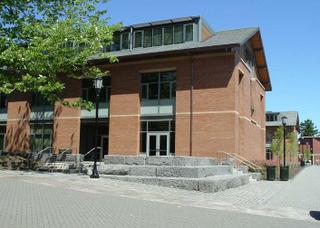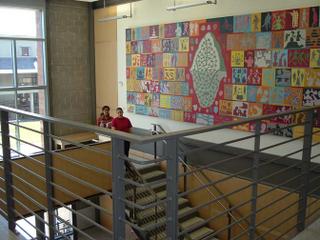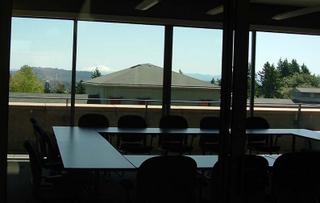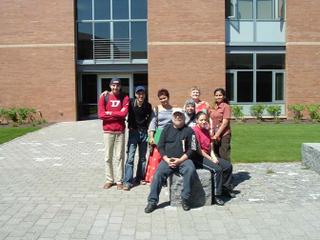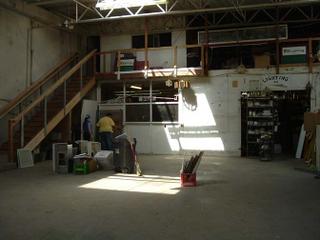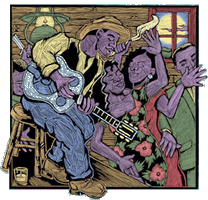Folks, today has been a funny day to say the least.
First, I oversleep and miss my first class, and get to my second class-- Foreign Policy-- almost,
almost too
late. Class was the stimulating universe in a golden vitamin C globe that it always is.
And then I got to read the article in the Oregonian, a local newspaper here in Portland, which was supposedly a feature article on all us international students here at Lewis & Clark college in the PLUS scholarship program.
The key word there is "supposedly".
People were left out. Single perspectives were concentrated on. Interviewees claim they were misquoted, or at least their views mis-communicated.
But that wasn't the worst. Oh no. Not by a dragon's ass.
The worst was the following bit (and I quote):
"...Priyanka Joseph, a 20-year-old from southern India with red highlights in her hair and the Black Eyed Peas on her iPod..."
The goblin's eyes grew to flaming cold slits. His curiously carved fingernails curved into the stone wall, the rock squealing for mercy. His concentrated frown suddenly turned an annoying but fuzzily cute blue otherwordly creature into a flat-footed evil from hell, who spewed the worst at enemies, from over-used nylon socks to insults pertaining to the unfortunate mortal's mothers. His stare caused a crack to develop in the far wall of the courtyard. A black hole appeared behind it... the servants ran screaming as the maniacal laughter of creatures locked up in the vast darkness for a thousand years rent the air with their adamantine freedom cries....Erm... yes. As I mentioned before, yours truly was a tad peeved.
My brick thus, is enclosed below.
I warn you. It's as ascerbic as the worst tempered lemon. And why not?
No one gets away with saying I have the Black Eyed Peas on my iPod. Screw you, biyatch. Eat my flaming words.
______________________
Date: Jul 11, 2005 4:42 PM
Subject: Re: 'Classroom with a world view ', appeared in The Oregonian, dated July 11, 2005.
Dear Shelby,
I felt moved to write this on reading your article published in the Oregonian today. It is unfortunate that due to computer errors you [and I assume, the editor] got the raw, incredibly impassioned, and pretty peeved version of what I'm writing to you now. The facts in this version remain the same, I do hope that thanks to a second and third reading of your article, my outlook is now a bit more sober and more understanding that it was an hour ago. And yes, I still do want to send this out to all the people concerned, because I feel it has to do with the way we all see the world.
To summarize my draft then- I had stated that I greatly admired your writing style, and did appreciate you taking time off to come visit with us at Lewis & Clark, and hear what we had to say. The "we" being- for those who were not present on this occasion- Zainab, Lamya and I, who are all students with the Dept. of State sponsored scholarship program called PLUS. I would also like to say at this point, that you had originally planned to speak to only Zainab and I, as you had informed us via email. I say this only because I want it recognized that I would've refused your interview, Shelby, since I don't like this kind of thing, except I thought that as I foreign student here I should be polite. Next time I'm sure I will pay more attention to my own gut instinct and choices.
I then went on to declare in my draft that I personally am never one to seek out publicity especially that of a newspaper, be it even one as esteemed as The Oregonian. I then said that this response to you and those involved has nothing to do with a lack of personal limelight or coverage. I said this because I want to ensure that no one misunderstands my motives for writing this piece, which are as follows-
Firstly, I have always been a student who has written about the things that has moved me the most. In the vernacular, that would be "whatever got me ragingly pissed off". This mode of communication happened through school and my college in India, and I consider it my freedom of expression. And considering others have the same sort of personal liberty, I try, most times, to ensure that I hurt no feelings in getting my point across with as much clarity as I can muster. So at this point, I would like to say I have no grudge against any person or institution, but would just like to voice my opinion.
Secondly- The first reading of your article left me asking questions about what exactly was the story you were trying to tell: was it about a class at Lewis & Clark College taught by Mr. Partovi, a scholarship program, young Arab women in America or all these put together? I then read this article over again, three times. And I begin to see that yes, it seems to be about all these three. This is good, and gives a lot of people a lot to read about. But one anxiety still remains: it concerns the effect of such an article on those who read it, who unlike you Shelby, did not get to hear all that was being said, but only get to read what you think—and quite justifiably so—is newsworthy. I have a problem with this because of the mental image your article creates, not only of the three elements I have already mentioned, but of the mental image it creates of the other individuals referred to collectively in your article- the other students in the foreign policy class, and the other students in the PLUS program present here at Lewis & Clark College. I have a problem with this because it offers only a narrow perspective, and doesn't tell the whole story.
And thirdly—And this is a petty motive, I will concede—I'm writing this article to state that I dislike being stuck in a paragraph in your article to add colour to the theme, and a refreshing change from the general storyline. I am no one's circus attraction, really. Call it an issue of pride, perhaps. I am but human. Mea culpa. But personally I think it would've been better for your article—and myself—if you had used a general, well-sketched paragraph about all us international students, and perhaps our music tastes and restaurant preferences, as a break from the main story rather than that one reference to just me. It would've pointed out a feeling of solidarity, it would've increased interest, and it would not leave me in a place wondering why one earth did I have to be mentioned, at all?
Now that motives have been stated, I need to talk about your article.
Let us assume that each of the three elements stated above—Partovi's foreign policy class, the PLUS scholarship and young Arab women—were each individually a theme in your article. I would like to deal with these separately.
Firstly, about Mr. Partovi's class: In your article, you have stated: "Partovi, who is more conservative than many of his Lewis & Clark students, often finds himself in the minority on the Southwest Portland campus…" Now I'm not sure about how American Journalism works, but I'm quite sure that such a sweeping statement requires just a tad bit more backing up than one student, and that too a summer session student's, point of view. Of course, if you did base this statement on fact that either Mr. Partovi himself or another student or faculty member supplied you with, then I retract and humbly apologize. But as a reader, it seems a distinct judgment of the Professor's stance by the author. I bring this up because I, like other students in Lewis & Clark College, know that though Mr. Partovi does not go yelling and waving slogans with the rest of the liberal bandwagon, and though he does quite brashly declare his liking for this country that offered him sanctuary and a place to grow and live in after the Iranian Shah was overthrown and he along with the other diplomats had to flee… though these stand as facts, I know Mr. Partovi to be an intense and energetic challenger of the decisions taken by present and past administrations belonging to this country's government. I know that he himself wrote to the President criticizing the move on Iraq. I know that he questions every conservative—and liberal—policy made by every administration till now. To me, this seems that Mr. Partovi is merely a subtle and keen-eyed intellectual, and not particularly conservative or liberal. And the problem with such statements in the newspaper is that that opinion turns public since it came from such an authority as The Oregonian. Otherwise, the fact that the class is a forum for students to speak based on fact, and to question everything is true, and granted. And of course, such classes, especially for students from a crisis-laden area, is of great importance because it means that important and immediate world issues are being discussed here and now. I fully agree with your article on this point.
As for the second element: you have mentioned facts and figures about the PLUS scholarship, and how the process of study moves the scholarship students through a two year period. Wonderful stuff, as the scholarship is a great idea and an open-minded venture by the Dept of State and the NGOs involved. However, it's the grouping and the generalization in your article that I have a problem with, which is what I will come back to after referring to the third element, which is young Arab women in America.
Now I understand that for the present day and age, such a theme, an element, is exactly what pushes a story. Women from traditionally oppressive countries and systems breaking out, coming forth, saying the good word, fighting the good fight. And if your story specifically had this element in mind as the core of the article, then I concede to that as well, and will continue this response solely based on my reaction to your article. However, if this element was NOT specifically your goal, then I have issues. Big ones. For such using of a minority—or a majority—voice to give context to the state of the entire group is just wrong. So wrong. Especially since this scholarship has aimed at bringing many minorities together, not just one. Especially since it aims to look at all countries, all stories, all students, not just one.
Your article talked about PLUS students. What about the others here? Am sure not everyone's parents or close relatives are involved with some noble politically-affiliated cause, but I am quite sure that each one has as big a story: all of which would've contributed to a more authentic reading of this story of international scholarship students here in Portland.
For example: there is a student who was detained by customs officials in New York for five hours, only because they asked him who Lewis & Clark were, and he replied that he did not know. There is a student here who's bags were searched in Charles de Gaulle airport in Paris only because she seemed more foreign than her companion, and thus more likely to be carrying suspicious objects. There is a student here who received indirect religious insinuations against his faith only because he did not eat the meat offered at the meal as it was not prepared according to the doctrine of his religion. This same student had to be polite, for after all he is a guest here in this country. There is a student here who has lost family and a brother in the Palestinian conflict, and is held up as the poster-child of all those who espouse the peoples' cause in the Middle East, with none of these cause supporters realizing the extent to which other Arab nations ignore the Palestinian conflict, and how the other Arab nations abandoned the Palestinian people when they needed help the most.
Of course, even the least cynical reader at this point would probably point out that the only reason for all this rodomontade is basically that I didn't like the way I was portrayed in your article. I don't deny that that isn't true. Being the child of my parents, being at the hub of student activity, decision making, forum forming and outreach activities in my city in India, and being a person who quite snobbishly considers herself a hopeful intellectual—It was hard for me to be described by red highlights [now faded, I must state the truth] and ipod usage. In my draft, which was accidentally sent to you, there was mention of how I strongly protested my saying, ""I'm like, 'I don't do blues,' ". I stated that I would never say "like"—good god, the horror. You, in your polite and speedy response [thank you for that] said that you put it down verbatim which is why you included it in your article. I remain upset—For if that is the truth, as I'm sure it is, then America is affecting my English much more than I thought it would, which means I have to be extra careful from now on.
But seriously.
I reiterate: it is not that A received the lion's share of article time, and B was given a passing reference. I repeat, I am not one for paper rustling and name quoting. But my point is, why did you have to include me at all? Or rather, why did you have to leave out all the others? You could say that it was because you were only covering those in the Foreign Policy class. But then why refer to the group outside of the class, in the context of the scholarship, with no other points of reference other than Zainab and Lamya? Of course, I respect Zainab and Lamya as my fellow students and my friends. But I'm wondering if you could honestly feel satisfied with the authenticity of your article, when it was meant to be a feature piece on international students—all elements considered—and you leave out the bits about the rest of the group. And indeed, in writing about the class, how could you leave out the perspective of the other students or at least one other student who does take Partovi's class and is a full-time student here?
Again, I am not the professional journalist. You are. But here I am, making the case out for those who you didn't speak to, and who also have stories that must be heard.
Those who think Partovi's class is one of the few real forums for liberal, intelligent discussion of world events and views on campus.
Those whose parents fought for citizenship, and who have known what refugee camps are like.
Those who have known religious orthodoxy, and are learning to live in harmony with more than just that one point of view.
Those who lost family in the tsunami, and missed weeks of college traveling up and down the coast, contacting relief material suppliers, co-coordinating volunteers from around India and the world, meeting with district government officials, consoling families, holding fund-raisers.
Tell the whole story Shelby. Or if not, tell just one. And leave those of us who don't listen to the black eyed peas on their ipod and never will, and who dislike being used for the oomph factor, out of your stories.
But once again, thank you for your time and energy. Am sure that the PLUS program, Lewis & Clark College and The Oregonian all gained from the article. I apologize profusely if any of my views seem boorish, narrow-minded or lacking in imagination. I did however, have to say this.
Yours sincerely,
Priyanka Joseph.
